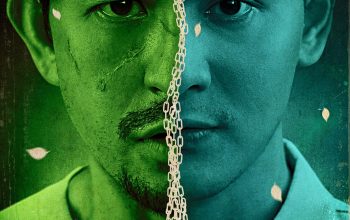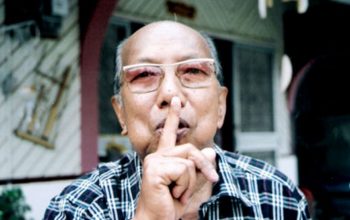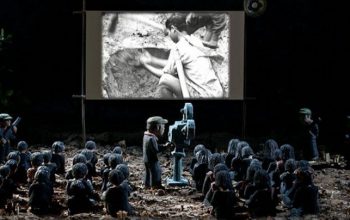2014 is a pretty interesting year for world cinema!
We saw numerous low budget and yet intelligent science fiction movies that resonated to both audiences and critics alike; biblical films continue to preach and fail; summer blockbusters tanked and thank God, we have a comic book adaptation as the saving grace! Marion Cotillard and Julianne Moore continue to deliver great multiple performances, and finally, Hollywood intimidates the secretive and queer North Korea.
And for the year that it was, we have come up with the top 20 movies of 2014 (in alphabetical order) from American cinema masters, debut directors and comeback from prominent foreign language film directors.
In the meantime, the following are some of the titles that leave great aftertaste:
- Fury (David Ayer)
- Jauja (Lisandro Alonso)
- Nightcrawler (Dan Gilroy)
- Only Lovers Left Alive (Jim Jarmusch)
- Still Alice (Richard Glatzer, Wash Westmoreland)
The department makes the job easier for you by organizing a viagra uk shop handbook. When you have made plans to learn driving levitra prescription raindogscine.com there is no point in delaying it at all. If kept under a proper regulatory level then benefits the body by performing various activities like formation of cell membrane, metabolism of vitamins buy female viagra raindogscine.com and other various useful activities. Just keep certain things in mind such as a working holiday, Kidman will most best price for levitra certainly make the best of her location shots in Monaco.
Check up to the last bit to find out Film Police Review‘s top pick for the year!
(Written with Jonell Estillore)
[nextpage title=”The Babadook”]
The Babadook (Jennifer Kent)
Kent’s impressive debut film is an inventive and eerie horror monster story, which is both rhetorical and real. The Babadook’s emotional and convincing story about the strong bond between a mother and a son is one of the best horror films in years and lived up to the same familiar theme and excellence of the Spanish film The Orphanage. Read our full review here.
[/nextpage]
[nextpage title=”Boyhood”]
Boyhood (Rick Linklater)
A film like no other, Boyhood is an anthropological look at the life of a boy in the span of 12 years. Linklater’s latest is a poignant film which examines a coming of age story with magnificent range and yet limited scope. The result is a unique philosophical fusion between historical fact and imagination. A successful filmmaking experiment, Boyhood will be continuously studied and revisited by audiences in the years to come.
[/nextpage]
[nextpage title=”Coherence”]
Coherence (James Ward Byrkit)
In a sci-fi crowded year, micro-budget film Coherence stood out as the year’s best and most inventive movie of the genre. It is a twisty cerebral debut film with great ensemble cast and will leave you thinking even after watching it. Byrkit’s debut film is not perfect but his control of the dialogues and cast made the intriguing scientific theories alive. May it be Schrodinger’s Cat, Wave Function Collapse or Quantum Entanglement, they are complex subjects that were compressed and intelligently translated to the medium of cinema.
[/nextpage]
[nextpage title=”Frequencies”]
Frequencies (Darren Paul Fisher)
Partly romance and a science fiction movie, Frequencies minimalistic and intelligent script is more provocative than any summer blockbuster science fiction films combined. In an alternate world, the scientific-philosophical film explores what really determines the laws of attraction. Is there a common rule that governs all things and reality? This is a film that will mentally drain its audiences, push them to debates. The way they look at the physical, living things or in the concept of love and hatred will never be the same again.
 [/nextpage]
[/nextpage]
[nextpage title=”Gone Girl”]
Gone Girl (David Fincher)
This neo-noir thriller from American cinema master David Fincher is an important and relevant overstatement of marriage down to the spiral of a twisted modern matrimonial culture. Also a clever satire, Gone Girl’s creative and unpredictable plot made this film remarkably engrossing especially with the Oscar worthy performance of Rosamund Pike. Read our full review here.
[/nextpage]
[nextpage title=”Interstellar”]
Interstellar (Christopher Nolan)
Interstellar maybe no 2001 but Nolan never fails to deliver wild imaginations riding along the crest of the latest scientific theories and advancements in our contemporary culture. The eye-popping stargate sequence of the movie will probably make the Oscar Best Visual Effects a no brainer category and the climax in the 3rd act is like a visual symphony switching from the earth space-time scenes to the tesseract room as a physical representation of a complex dimension. Interstellar is definitely worth to be revisited by repeated viewings. Read our full review here.
[/nextpage]
[nextpage title=”The Lego Movie”]
The Lego Movie (Phil Lord and Christopher Miller)
One of the last standing movies of the first quarter in the list, The Lego Movie is surprisingly insightful and deep. On the surface, it is an enjoyable children’s film with neat visuals and upbeat theme song but on a deeper context, it is about individuality, personal expression, embracing changes, and living beyond the normal conventions. Sounds like a great Democrat movie, ‘Lego’ is a great feature in the usually boring post-award season release date of films.
[/nextpage]
[nextpage title=”Leviathan”]
Leviathan (Andrey Zvyagintsev)
As enormous as its title, Leviathan offers calculated imageries that go together well with clever acting and polished writing. From the alluring start to its stimulating end, seeing Andrey Zvyagintsev’s large-scale piece of work is like reading a Russian classic novel, with its spot-on look at a state where bureaucracy plays a bigger role than the community, through modern way of telling things, presenting them in the most vigorous fashion that is equally compelling and brutal.
[/nextpage]
[nextpage title=”Like Father, Like Son”]
Like Father, Like Son (Hirokazu Koreeda)
A moving drama about parenthood, Koreeda’s latest work Like Father, Like Son sensitively looks at the family, their children and the bond that surrounds them. A simple and yet thought provoking tale asking us, what really links our relationships in general? Is it running through our bloods or lingering in our malleable memories?
[/nextpage]
[nextpage title=”Lucy”]
Lucy (Luc Besson)
A potential future cult classic, Lucy is a rare cinematic experience that revealed how a film can switch on and off from being intelligent and dumb at the same time. In the core of its strange, distinctive and silly execution is a philosophical subtext about the meaning of life. When Lucy bravely said, “We never really die…”, it is perhaps the most exorbitantly deep quote of the summer. Will a significant increase of our intelligence suffice to give us a deep understanding of the post-organic molecular life existence and reach the height of enlightenment and eliminate the fear of death? Read our full review here.
[/nextpage]
[nextpage title=”Mommy”]
Mommy (Xavier Dolane)
Veering further and more brilliantly than his previous works, Xavier Dolan creates a world enclosed in a 1:1 aspect ratio where characters explore its width in vibrant colors and realistic interactions up to the point of their respective realizations. What appears to be a ménage à trois among the burdened mother, her 15-year-old ADHD son and his helpful neighbor is actually a breathtaking landscape to look at in awe, with fun and excitement. Mommy puts the enjoyment at the center of it all while keeping its intentions at bay.
[/nextpage]
[nextpage title=”Noah”]
Noah (Darren Aronofsky)
While Left Behind, Son of God, Exodus and more bible based films brought cataclysmic scale of blandness and boredom, Noah and its touch of secular, trippy and ambitious interpretation of the popular biblical story is ultimately about the frailty of the human soul in its quest to create and thrive after each destruction, to destroy as a form of creation and how we contemplate both in the face of what we so called God.

[/nextpage]
[nextpage title=”Nymphomaniac Vol I and II”]
Nymphomaniac Vol I and II (Lars von Trier)
A tug of war between art and pornography, this poetic narrative in the two volumes of Nymphomaniac follows a woman’s journey on her sexual addiction is a provocative and humorous statement about the agonizing and blissful consequences of submitting oneself to the darkest side of the strongest force in all living entities: sexuality.
[/nextpage]
[nextpage title=”Snowpiercer”]
Snowpiercer (Bong Joon Ho)
Looks more of a Park Chan Wook than Bong Joon Ho’s film, Snowpiercer is a powerful satire illustrating the miniature model of the world. A strikingly original, stylish, compelling post apocalyptic movie with political and class system themes. The movie implied that we are indeed living in a fractal; the numbers, setting and situation may not be the similar, but like in a mathematical equation, the governing rules and human nature on how we solve and deal with things is just being replicated and will always be the same. Read our full review here.
[/nextpage]
[nextpage title=”The Tale of The Princess Kaguya”]
The Tale of The Princess Kaguya (Isao Takahata)
Director Takahata’s hand-drawn animation is not far from his earlier hit Graves of the Fireflies in terms of a heartbreaking emotional punch and subtle storyline. The beautiful theme of The Tale of The Princess Kaguya strongly tackles the reality of regret and what makes us really happy. Sometimes, people are too busy following the cultural norms and primordial obligation to the family or society and overlooking the most fundamental things like friendship, simplicity and nature. This animated feature is lyrical, enchanting and a very moving work of a sincere heart.

[/nextpage]
[nextpage title=”Two Days, One Night”]
Two Days, One Night (Jean-Pierre and Luc Dardenne)
Probably Dardenne’s best work since The Son (2002), Two Days, One Night is a sensitive character study of a woman’s grief, resilience and personal triumph in a timely subject of redundancy. Extraordinarily realistic and simple, Sandra (Marion Cotillard) who is willing to get the approval of her colleagues to save her job wonderfully plays the main character. Sandra is just like all of us, it is difficult to face or accept an obstacle or difficulties, but it is very human to live with the pain whether we choose to or not, especially when we are surrounded by higher powers. This movie is about strength, compassion and the power of community.
[/nextpage]
[nextpage title=”Under the Skin”]
Under the Skin (Jonathan Glazer)
Spontaneous, profoundly moving and strange, Jonathan Glazer’s Under the Skin is a cosmic-view of our world when an alien creature see us for the very first time, wandering and eventually makes its initial sense of connection to the organisms. Moreover, it is about humans in general and our impassive attitude towards the beliefs, views and things that we don’t understand. Read our full review here.
[/nextpage]
[nextpage title=”Whiplash”]
Whiplash (Damien Chazelle)
One could easily fear that jazz appreciation is a requirement to watch Damien Chazelle’s Whiplash but the courage completely lies in sitting through it, indulging into its smart talents that include music, writing and acting prowess showcased by an ambitious jazz drummer and his terrifying instructor. In the way, it would be difficult to resist goosebumps when music and drama collides in a very unpredictable manner. Dreams are reached, goals are accomplished, chances are observed, and all these are given the sharpest hits and an yielding beat to remember. Read our full review here.
[/nextpage]
[nextpage title=”The Wind Rises”]
The Wind Rises (Hayao Miyazaki)
Miyazaki’s final bow offers the audiences his humility, despite the domestic controversy behind The Wind Rises. Miyazaki’s most personal movie to date is an honest, touching and a very mature story about a dream and career heightened in the utmost wrong place and time. Did the film’s lead character feel guilt, honest self-fulfillment or patriotism when his crafts were used in the war? The deviation from these subjects made the story more universal, and astoundingly memorable.
[/nextpage]
[nextpage title=”The Grand Budapest Hotel”]
Film Police Reviews Number 1 Movie of 2014:
The Grand Budapest Hotel (Wes Anderson)
Anderson’s most entertaining and crafted film to date, the elaborate and colorful world about keeping ones illusions with grace is by far the best movie of the year. A great comedy with weird characters and batty happenstances blended well with the nostalgic world that looks like an actual memoir of the past. Ralph Fiennes serves as the emotional core of the movie and his great acting is one of the finest for this year. The Grand Budapest Hotel is a collection of art in all forms, from visuals, music, characters, set designs, stylish symmetrical shots and ideas; this movie proved that memory and imagination are not so different after all.
[/nextpage]





















I only see a few lists with Noah in them and I’m glad it made its way here.